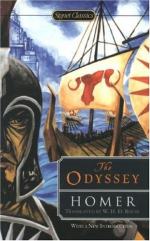{* Reading [Greek], which is a correction. Or keeping the MSS. [Greek] ’and this should bring thee in a goodly price,’ the subject to [Greek] being, probably, the sale, which is suggested by the context.}
So spake the wooers, but he heeded not their words, in silence he looked towards his father, expecting evermore the hour when he should stretch forth his hands upon the shameless wooers.
Now the daughter of Icarius, wise Penelope, had set her fair chair over against them, and heard the words of each one of the men in the halls. For in the midst of laughter they had got ready the midday meal, a sweet meal and abundant, for they had sacrificed many cattle. But never could there be a banquet less gracious than that supper, such an one as the goddess and the brave man were soon to spread for them; for that they had begun the devices of shame.
Book XXI
Penelope bringeth forth her husband’s
bow, which the
suitors could not bend, but was bent by
Odysseus.
Now the goddess, grey-eyed Athene, put it into the heart of the daughter of Icarius, wise Penelope, to set the bow and the axes of grey iron, for the wooers in the halls of Odysseus, to be the weapons of the contest, and the beginning of death. So she descended the tall staircase of her chamber, and took the well-bent key in her strong hand, a goodly key of bronze, whereon was a handle of ivory. And she betook her, with her handmaidens, to the treasure-chamber in the uttermost part of the house, where lay the treasures of her lord, bronze and gold and well-wrought iron. And there lay the back-bent bow and the quiver for the arrows, and many shafts were therein, winged for death, gifts of a friend of Odysseus, that met with him in Lacedaemon, Iphitus son of Eurytus, a man like to the gods. These twain fell in with one another in Messene, in the house of wise Ortilochus. Now Odysseus had gone thither to recover somewhat that was owing to him from all the people, for the men of Messene had lifted three hundred sheep in benched ships from out of Ithaca, with the shepherds of the flock. In quest of these it was that Odysseus went on a far embassy, being yet a lad; for his father and the other elders sent him forth. Moreover, Iphitus came thither in his search for twelve brood mares, which he had lost, with sturdy mules at the teat. These same it was that brought him death and destiny in the latter end, when he came to the child of Zeus, hardy of heart, the man Heracles, that had knowledge of great adventures, who smote Iphitus though his guest in his house, in his frowardness, and had no regard for the vengeance of the gods, nor for the table which he spread before him; for after the meal he slew him, his guest though he was, and kept for himself in the halls the horses strong of hoof. After these was Iphitus asking, when he met with Odysseus, and he gave him the bow, which




